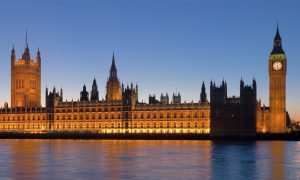 The future of Britain’s involvement with the European Union was the biggest e-cig-related issue in the UK’s general election – and it remains as unclear as everything else after an inconclusive result.
The future of Britain’s involvement with the European Union was the biggest e-cig-related issue in the UK’s general election – and it remains as unclear as everything else after an inconclusive result.
Prime minister Theresa May’s Conservative party lost its majority in the House of Commons and needs the likely help of the Democratic Unionist Party (DUP) – a heavily right-wing Northern Irish party with ten members in the UK parliament – in order to continue in power.
In this climate, e-cigarettes will remain a minor concern. Devolved regional governments in Northern Ireland, Scotland and Wales are likely to press ahead with further regulation while England, and the UK as a whole, will be more concerned with other issues.
Chief among them will be so-called Brexit – the UK’s impending departure from the EU. It could be argued that the election result is a blow against a “hard Brexit” – a quick severance of ties that would exclude the UK from the European Economic Area (EEA) but also give it room to repeal more EU regulations, such as the Tobacco Products Directive (TPD).
Take-it-or-leave-it
The prospect of a hard Brexit always appeared slim, however. Instead a slower-paced negotiation is likely to take place, with a large number of issues to be discussed. One that will almost certainly not be debated is the TPD.
European commentators suggest the UK will be offered a take-it-or-leave-it deal for continued participation in the EEA which will come with the acceptance of a wide range of EU regulations as well as the free movement of people.
Immigration will be the biggest target if UK negotiators attempt to change any terms, leaving an issue such as TPD compliance as an afterthought at most.
May has previously promised to remove the UK from the European Customs Union, but the loss of her majority is likely to make it more difficult for her to achieve this.
Low priority
Members of her government have previously spoken in favour of vaping on harm-reduction principles. But decisions about e-cigs – both domestically and in relation to the EU – will be a low priority at a time of political turmoil.
The Conservatives (also known as Tories) continue to be supporters of e-cigarettes as reduced-risk products and are generally believers in lighter-touch regulation. There has been noted support of e-cigarettes from Tory members of parliament (MPs) such as Mark Pawsey, chair of the e-cig all-party parliamentary group (APPG) – an informal lobbying group at which industry stakeholders can meet members of the government.
Last year three DUP MPs signed early day motions (non-binding declarations of position for further debate) in support of e-cigarettes, suggesting their party may also be in favour of vaping.
However, the party does not mention preventative public health measures at all in its policy promises. Instead it focuses purely on boosting the National Health Service – the UK’s public health system – through measures such as increased funding and staffing.
In Scotland, meanwhile, poor results for the Scottish National Party (SNP) raise questions over the future of the party that has been seeking more stringent e-cigarette regulation in the Scottish Parliament, which it currently controls. However, the next elections to that body – as opposed to the Westminster parliament which governs the whole of the UK – are not due until 2021.
What This Means: Another election, confusion as usual in UK politics – seemingly the norm ever since Tony Blair stepped down as prime minister – and no new clarity on e-cigs or anything else.
One voter put it best when he texted the BBC: “So the Conservatives won, but lost. Labour lost, but won. The SNP won and lost in Scotland but still won and the Conservatives won in Scotland but still lost. UKIP [UK Independence Party] lost but because of Brexit had already won. And the winner, Mrs May, is being told to resign because she didn’t win and she won’t because she won even though she lost.”
– Freddie Dawson ECigIntelligence staff
Photo: Wikimedia Commons







